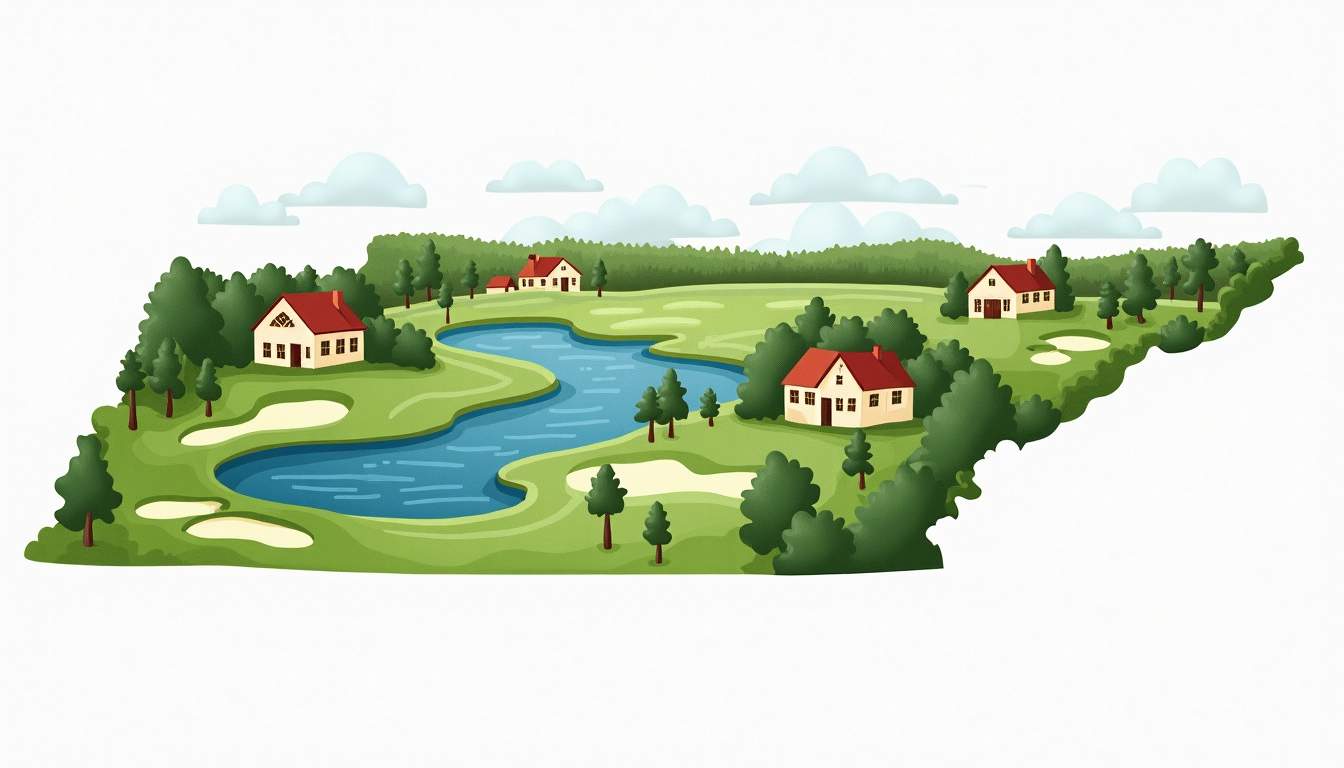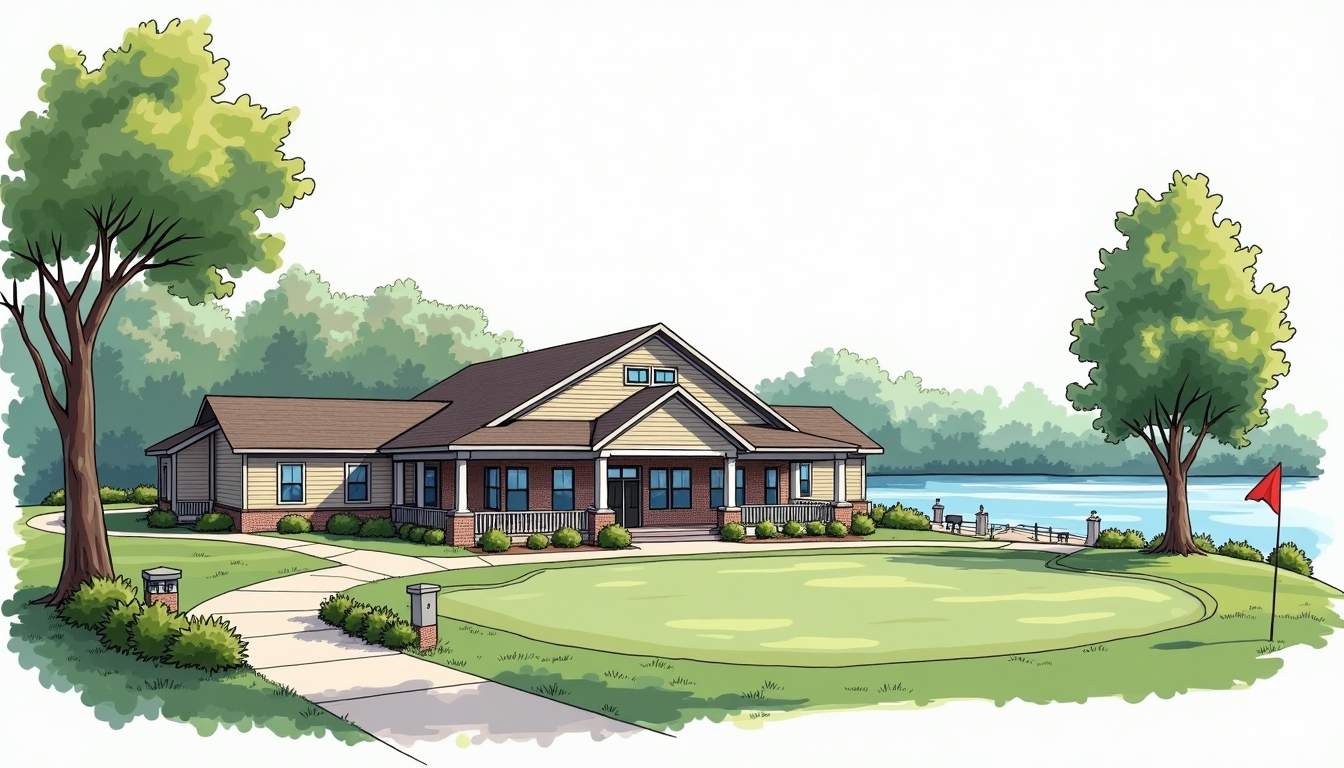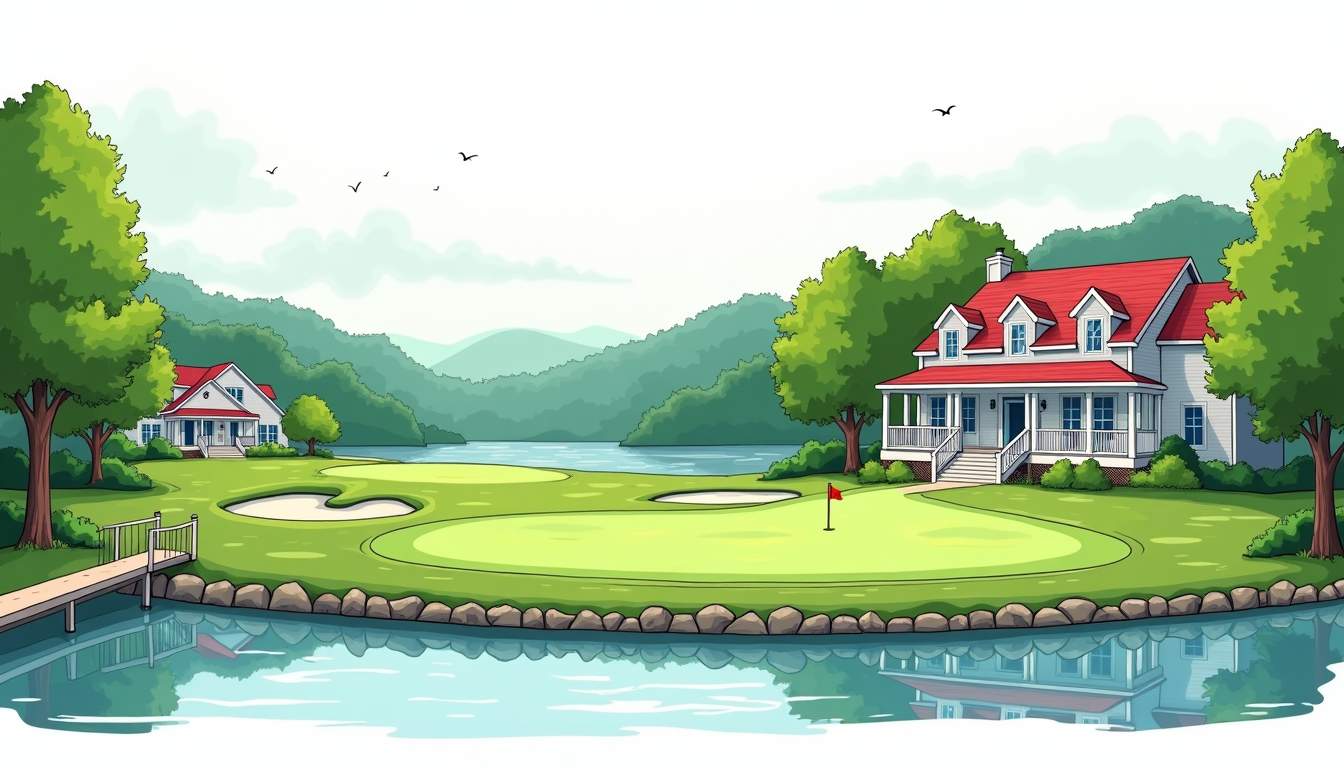
Living near a fairway or a shoreline in Tennessee offers a combination of leisurely pastimes, scenic views, and communities designed around outdoor living. From rolling hills dotted with championship golf courses to expansive reservoirs and quiet river coves, Tennessee's real estate market includes properties that appeal to retirees, families, and weekend escape-seekers alike. This article examines what makes golf and water-access homes in Tennessee desirable, the distinct regions and communities where they are found, practical buying considerations, and the lifestyle that accompanies these properties.
Tennessee's varied topography creates opportunities for both golf course developments and waterfront properties. The state offers mountain vistas in the east, fertile valleys in the middle, and broad river systems and man-made lakes across the region. Mild winters and four distinct seasons make outdoor recreation possible for much of the year, which is attractive for people seeking an active lifestyle without extreme weather.
Affordability compared to some coastal and mountain resort markets brings buyers from other states looking for value. Many communities in Tennessee combine well-designed residential developments with amenities such as clubhouses, marinas, walking trails, and on-site dining. That combined lifestyle—convenience of amenities plus nature access—drives steady demand for both golf-course homes and lake or riverfront residences.
In addition, Tennessee's efficient infrastructure and accessibility further enhance its appeal. Major cities like Nashville, Knoxville, and Chattanooga offer regional airports and interstate highways, making weekend getaways to golf or water destinations convenient for urban dwellers. This blend of accessibility with secluded residential settings allows buyers to enjoy tranquility without sacrificing connection to city comforts and services.
The state’s commitment to environmental conservation also supports the growth of quality outdoor living spaces. Many golf courses in Tennessee are designed to complement the natural landscape, preserving wooded areas and waterways, while waterfront communities benefit from state programs aimed at maintaining clean and safe lakes and rivers. This focus on sustainable development ensures that homebuyers can relish pristine environments alongside their recreational pursuits.
Northern Tennessee around the Cumberland Plateau and the Highland Rim features several private and semi-private golf courses paired with residential subdivisions. Middle Tennessee, particularly around Nashville and its satellite towns, has seen recent growth in planned communities with golf facilities and artificial lakes. In East Tennessee, the Appalachian foothills host resort-style developments with mountain views and easy access to rivers and reservoirs.

East Tennessee blends mountains, rivers, and outdoor recreation. Communities near the Tennessee River and its tributaries often provide docks, boat slips, and direct water access, while nearby golf clubs take advantage of dramatic elevation changes. These locales appeal to buyers seeking scenic terrain with year-round outdoor options like hiking, boating, and golf.
Middle Tennessee benefits from proximity to Nashville's employment and entertainment while offering suburban and exurban developments built around golf courses and lakes. Newer master-planned communities often integrate mixed housing types, walking paths, community pools, and golf facilities, creating cohesive neighborhoods where social and recreational life centers on shared amenities.
West Tennessee's large reservoirs and river systems host quieter lakefront neighborhoods and more laid-back golf courses. These areas attract buyers looking for slower-paced country living, often with larger lots and an emphasis on tranquility rather than upscale resort amenities.
Properties range from homes that face a fairway to lots with private docks and full panoramic lake views. The differences in location, deed restrictions, and community structure significantly affect lifestyle and resale value. Understanding the spectrum—from condo-style living near a clubhouse to secluded lakehouses with boat access—is crucial when deciding which property type fits best.
Golf-course homes commonly include features meant to enhance outdoor living and enjoyment of the course: patios or balconies overlooking fairways, storage for clubs, and easy access to clubhouses. Communities can be member-owned clubs, private, semi-private, or public, and each model influences fees, access rights, and social opportunities. Buyers should consider club membership requirements and ongoing dues as part of the ownership cost.
True waterfront homes may have private docks, boathouses, or sandy/rocky shoreline access. Lot orientation, shoreline stabilization efforts, and floodplain considerations are important. Some properties sit on rights-of-way that allow community boat access without full private frontage, while others enjoy absolute private shoreline control. The distinction affects privacy, recreation, and long-term value.
Beyond the main attractions of golf or water access, communities typically offer an array of amenities that enhance daily living. Clubhouses often host dining options, fitness centers, event spaces, and organized activities such as leagues, clinics, and social clubs. Waterfront neighborhoods commonly provide shared marinas, boat ramps, fishing piers, and seasonal events.

For many buyers, the social fabric created by these amenities is as important as the physical property. Regular events, volunteer opportunities, and casual gatherings create a sense of belonging and encourage active lifestyles. Communities that balance privacy with social programming tend to retain desirability and stability in property values.
Purchasing a golf- or water-access home requires attention to several practical and legal elements that can differ from standard residential purchases. Among these are covenants and restrictions, HOA rules, easements for water access, insurance requirements, and maintenance responsibilities for shared facilities. Understanding these details upfront prevents unwelcome surprises later.
Many communities use homeowners associations to manage common areas, enforce aesthetic standards, and run amenities. HOA fees can vary widely and may include landscaping, road maintenance, security, and access to recreation facilities. Covenants might limit exterior modifications, rental options, and the addition of docks or other shoreline structures. Reviewing HOA documents carefully is essential for long-term satisfaction.
Waterfront ownership can be complicated by riparian rights, public access laws, and federal or state regulations that govern shorelines and navigable waters. In Tennessee, man-made reservoirs are administered by federal agencies in many cases, which leads to specific rules around docks and shoreline modifications. A thorough title search and consultation with local regulators clarify what improvements are permissible.
Water-access properties often sit in flood-prone areas. Flood insurance may be required by lenders and is typically a separate policy from standard homeowners insurance. Elevation certificates, proper grading, and flood mitigation measures can reduce premiums and risk. For golf-course homes, potential hazards include errant golf balls; liability and homeowner policies should be reviewed to verify coverage scope.
Owning a golf or waterfront property carries maintenance obligations that affect time and budget. Shoreline management, dock upkeep, and marsh or bank stabilization require periodic attention. Golf communities may require yard maintenance to adhere to course aesthetics, while master-planned areas include landscaping services in HOA fees. Planning for these ongoing costs avoids surprises.
Seasonal factors matter as well. Boating seasons dictate dock and motor maintenance schedules, winterizing practices, and storage needs. Golf seasonality influences usage of club facilities and can affect temporary rental demand for secondary homes. Buyers should budget for peak-season activity as well as off-season maintenance when usage drops.
Properties offering genuine water frontage or quality golf course views generally retain value well, particularly in markets with limited supply. However, market dynamics such as local employment, tourism, and overall economic health influence resale potential. Locations close to urban centers or desirable lifestyle hubs often outperform remote properties when it comes to appreciation and buyer interest.
Renovation choices that respect the character of the community and improve energy efficiency and comfort tend to add value. Practical upgrades—like improved dock facilities, modern HVAC systems, and resilient landscaping—offer strong returns because they reduce long-term maintenance and appeal to active buyers.
Mortgage lenders evaluate waterfront and golf properties using similar metrics as other residential loans, but appraisals must reflect unique amenities and flood risk. Lenders may require additional documentation, including surveys, elevation certificates, and proof of insurance. For second homes or rental properties, down payment and interest rate expectations may be higher.
Property taxes vary by county and can be influenced by assessments related to waterfront features or community amenities. Some areas levy special assessments for marina upkeep or dam maintenance. Tax benefits such as mortgage interest deductions apply in many cases, and working with a local tax professional helps clarify how ownership affects personal taxes.
Living near water or a golf course encourages an active, outdoor-oriented lifestyle. Daily walks on maintained paths, early-morning rounds of golf, and afternoons on a boat create routines centered on physical activity and relaxation. Social interactions at club events and dock gatherings enrich community life and can reduce isolation for those transitioning to retirement or downsizing.

Access to nature has proven mental and physical health benefits—lower stress, improved mood, and increased opportunities for social connection. For families, these settings provide safe outdoor spaces for children to learn boating or golfing skills, while for individuals, they offer low-impact activities that promote longevity and wellbeing.
Choosing between golf access, water access, or a combination of both hinges on lifestyle priorities, budget, and long-term plans. A careful evaluation of community rules, shoreline rights, maintenance responsibilities, and local market trends helps ensure the chosen property fits both daily life and investment goals. Whether seeking a peaceful lakeside retreat, an active golf-community residence, or a property that blends the two, Tennessee presents a wide range of options that celebrate outdoor living and Southern hospitality.
Research, local guidance, and a clear sense of how the property will be used seasonally are important steps toward a satisfying purchase. The right golf- or water-access home can provide years of recreation, connection, and scenic enjoyment for those who value natural surroundings and community amenities.
Embrace the exceptional lifestyle you've been exploring with Tennessee National, a premier gated community perfectly blending luxury living, a Greg Norman Signature Golf Course, and private waterfront amenities. Whether you desire a move-in ready residence or a custom-built home, you’ll find the perfect setting here to enjoy scenic nature trails, vibrant social clubs, and exclusive events. Take the next step toward making your dream golf or water-access home a reality—schedule your private tour today and experience resort-style living at its finest.